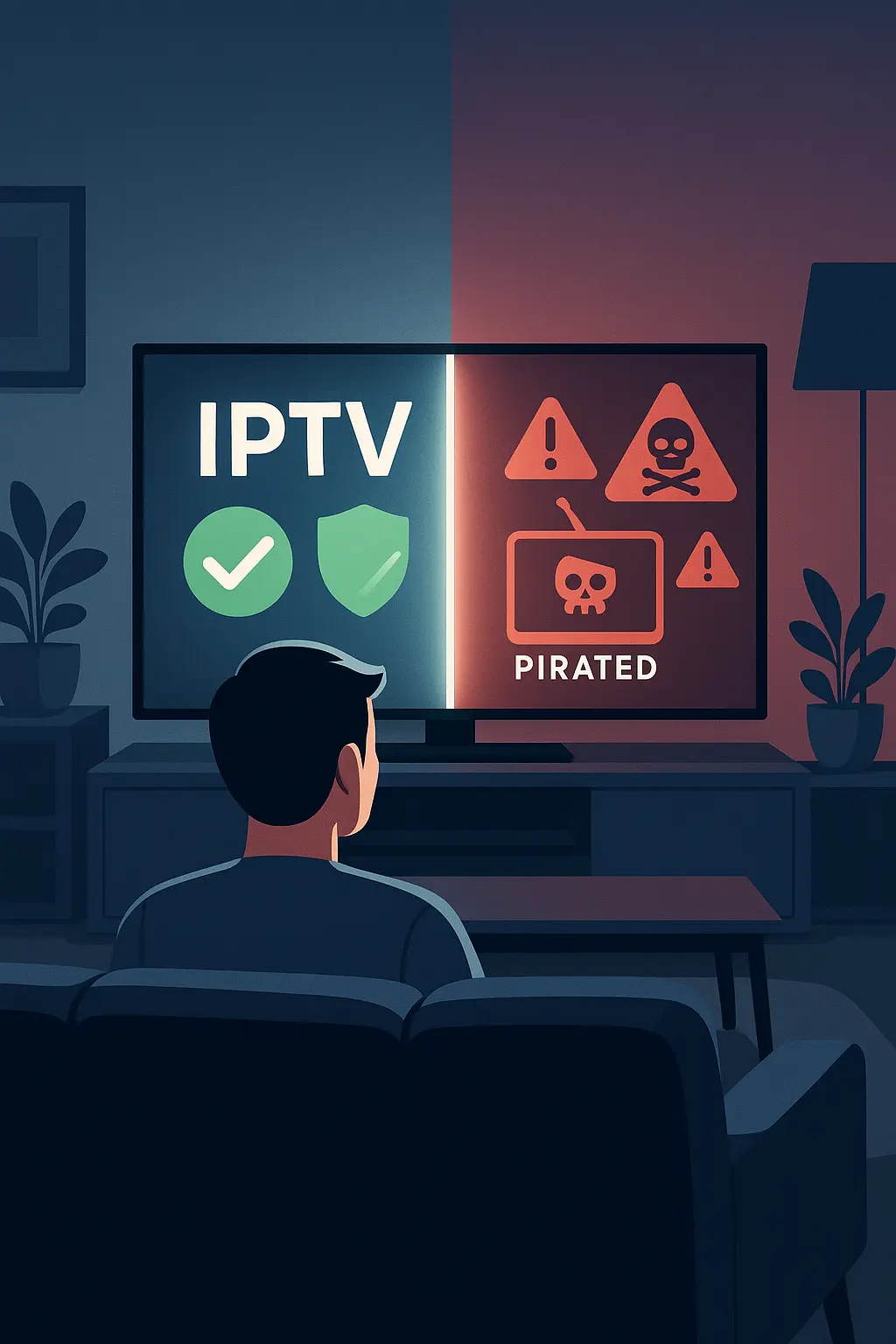In the fast-changing world of digital entertainment, IPTV legal concerns have taken center stage as more users switch from traditional cable and satellite services to online streaming. IPTV, or Internet Protocol Television, is growing fast—but one question keeps surfacing: is IPTV legal?
With countless IPTV providers offering a wide range of streaming content, it’s vital to separate fact from fiction. This guide breaks down everything you need to know about IPTV legal issues in 2025, how to spot legitimate services, and how to avoid copyright-related trouble.
Introduction to IPTV
What is IPTV?
IPTV stands for Internet Protocol Television. Unlike conventional broadcast methods, IPTV delivers television content via the internet. This enables features like on-demand viewing, live TV, and catch-up shows through apps or set-top boxes.
Types of IPTV Services
There are three primary types of IPTV:
-
Live TV: Real-time broadcasts like sports and news
-
Video on Demand (VOD): Accessing movies or shows anytime
-
Time-shifted Media: Watching previously aired programs
Understanding these types helps consumers better assess IPTV legal status based on how content is delivered.
Understanding IPTV Legality
Legal IPTV vs. Illegal IPTV
Not all IPTV services are the same. IPTV legal services hold proper licensing agreements to distribute content. In contrast, illegal IPTV streams content without permission, violating intellectual property laws. The technology itself isn’t illegal—it’s the use that matters.
Key Factors That Determine IPTV Legal Status
-
Presence of licensing agreements with content owners
-
Regional broadcasting rights and compliance
-
Consent from copyright holders
These elements directly influence whether an IPTV provider is legally authorized to stream certain content.
How Copyright Laws Impact IPTV
Copyright Protection and Broadcasting Rights
All television content is protected under copyright law. Only licensed distributors can broadcast such content legally. Unauthorized redistribution through IPTV violates these laws, turning an otherwise innovative tech into a potential legal hazard.
Penalties for Illegal Streaming
Engaging with IPTV that isn’t IPTV legal can result in:
-
Fines and legal actions for viewers in some jurisdictions
-
Criminal charges or shutdowns for distributors
Legal IPTV Providers and Their Features
Examples of IPTV Legal Providers
The following platforms are fully IPTV legal and operate with valid content licenses:
-
Hulu + Live TV
-
YouTube TV
-
Sling TV
-
fuboTV
Benefits of Using Legal IPTV Services
-
Higher streaming quality
-
Freedom from malware risks
-
Strong customer service
-
Zero legal concerns
Choosing IPTV legal providers ensures a safe and hassle-free viewing experience.
Red Flags of Illegal IPTV Services
Too Good to Be True Prices
If you see IPTV services offering hundreds of channels at rock-bottom prices, be cautious. Such services likely aren’t IPTV legal and could be redistributing pirated content.
Lack of Official Licensing
Legit IPTV providers will display licensing information transparently. The absence of such data is a warning sign that a service isn’t IPTV legal.
Global Perspective: Is IPTV Legal Around the World?
IPTV Legal Status in the US, UK, Canada, and EU
-
USA: IPTV legality falls under DMCA enforcement.
-
UK: Streaming unlicensed IPTV violates the Copyright, Designs and Patents Act.
-
Canada: Unlicensed streaming violates the Canadian Copyright Act.
-
EU: Copyright Directive protects content creators across member states.
Variations in Enforcement
While IPTV technology is legal globally, enforcement and penalties vary by region. Knowing local IPTV legal rules is key to staying protected.
How to Check If an IPTV Service is Legal
Licensing Verification Steps
To determine if an IPTV service is IPTV legal:
-
Look for licensing info on their website
-
Check company registration details
-
Verify with third-party reviews and government listings
Resources to Confirm IPTV Legal Compliance
-
Government copyright offices
-
Industry watchdog organizations
-
Verified online streaming communities
Risks of Using Illegal IPTV Services
Malware & Security Threats
Non-legal IPTV apps may contain:
-
Data-stealing malware
-
Ransomware
-
Spyware
Legal Consequences
Using non-IPTV legal services can result in:
-
ISP blacklisting
-
Legal fines
-
Criminal prosecution in severe cases
Grey Areas in IPTV Usage
IPTV Boxes and Kodi Add-ons
Devices like Android or Kodi boxes blur the line between legal and illegal. Pre-installed pirated apps make these services non-IPTV legal, even if the hardware itself is lawful.
When It’s Legal But Not Ethical
Some IPTV services exploit regional broadcasting loopholes. While technically legal in some places, such methods may still violate ethical or copyright standards.
Legal Alternatives to Illegal IPTV
IPTV Legal Streaming Services
-
Netflix
-
Amazon Prime
-
Disney+
-
Apple TV+
Free and Paid IPTV Legal Options
-
Free: Pluto TV, Tubi, Crackle
-
Paid: HBO Max, Paramount+, Peacock
Choosing recognized brands guarantees the service is IPTV legal.
What Law Enforcement Agencies Say About IPTV
Crackdowns and Arrests
Recent IPTV legal enforcement actions include:
-
UK raids on major illegal IPTV hubs
-
US lawsuits against resellers under DMCA
Public Statements and Guidelines
Authorities worldwide have reiterated the need to use IPTV legal services and to report suspicious content distributors.
Recent Legal Cases and Precedents
Landmark IPTV Legal Cases
-
Set TV (USA): Over $90 million in fines for copyright violations
-
Flawless IPTV (UK): Multiple arrests and legal crackdowns
Impact on Viewers
These cases show how seriously IPTV legal violations are taken—even viewers could be held accountable.
Consumer Responsibility and Awareness
Know Your IPTV Legal Rights and Risks
Education is your best defense. Understand the IPTV legal landscape before subscribing to any service.
Stay Informed About IPTV Legal Developments
-
Follow trusted news sources
-
Be skeptical of “too good to be true” IPTV offers
-
Always verify legality before purchasing
The Future of IPTV Legality
Tech Advancements and Legal Boundaries
As IPTV evolves, so will copyright enforcement. The line between legal and illegal content will become clearer.
Predictions for IPTV Legal Trends
Expect:
-
Enhanced tracking technology
-
Stronger global copyright laws
-
More transparency from IPTV legal providers
FAQs About IPTV Legal Issues
1. Is IPTV legal in the US?
Yes, if the provider has proper content licenses.
2. Can I get in trouble for watching IPTV?
Yes, using non-IPTV legal services can lead to fines or legal action.
3. How do I check if an IPTV service is legal?
Research licensing, registration, and third-party reviews.
4. Are IPTV boxes illegal?
Not inherently, but boxes with pirated apps are not IPTV legal.
5. What’s the punishment for illegal IPTV use?
Fines, court cases, or jail time depending on the country.
6. Is selling IPTV legal?
Only when the seller distributes content through IPTV legal platforms with appropriate licenses.
Conclusion: Navigating the IPTV Legal Landscape
IPTV legal use is not just about avoiding fines—it’s about making ethical choices and supporting content creators. By choosing licensed services, verifying legality, and staying informed, you’ll enjoy worry-free, high-quality entertainment. Always remember: if you have to ask “Is this IPTV legal?”—it’s worth double-checking before you stream.




